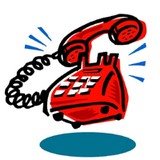 Used to be an everyday annoyance -- those unwanted solicitors interrupting your dinner with subscription offers, charity petitions, or questionnaires. Then came voice mail, the “National Do Not Call Registry,” and cell phones with caller ID. Not so many telemarketers on the other end of the line anymore, it seems. Not so many occasions to be asking that question “why are you calling?”
Used to be an everyday annoyance -- those unwanted solicitors interrupting your dinner with subscription offers, charity petitions, or questionnaires. Then came voice mail, the “National Do Not Call Registry,” and cell phones with caller ID. Not so many telemarketers on the other end of the line anymore, it seems. Not so many occasions to be asking that question “why are you calling?”Nonetheless, I found myself repeatedly asking that question aloud to myself during a curious session of limit hold ’em yesterday ($0.50/$1.00, 6-max). I’d been running fairly badly over on Party (losing over 40 BB in just a couple hundred hands). This was partly due to a run of so-so cards, but really mostly thanks to my having run up against some aggressive, fairly crafty players. (Yes, they do turn up now and then, even at these levels.) So I moved over to Stars and multitabled a bit. I actually ran three tables, something I don’t normally do. I might have been partly inspired by my friend derbywhite’s recent four-table experiments, but mostly I was looking to get back even a little more quickly (not always a good strategy for me, as I’ve written about before). Things worked out, however, as I got it all back and then some. I won modest amounts on two of the tables (about 5 BB) and absolutely killed on the third (taking over 50 BB). That third table was the one where I found myself wondering why exactly some of my opponents were calling (rather than raising or folding) so often. Here are a couple of examples.
Had a hand where I was dealt

 in the small blind. Two players called, I raised, and the big blind and both limpers called. The four of us then saw a flop of
in the small blind. Two players called, I raised, and the big blind and both limpers called. The four of us then saw a flop of 

 . Now I was already up about 20 BB at this table by simply playing it straight. (Indeed, I don’t think I’d lost a single showdown to this point.) I bet out, planning to let it go should any undesirable action ensue. The big blind folded, as did the first limper. The fellow in late position called, making me think diamond draw, gutshot straight draw, middle pair, or (most likely) King-lousy kicker. The turn was the
. Now I was already up about 20 BB at this table by simply playing it straight. (Indeed, I don’t think I’d lost a single showdown to this point.) I bet out, planning to let it go should any undesirable action ensue. The big blind folded, as did the first limper. The fellow in late position called, making me think diamond draw, gutshot straight draw, middle pair, or (most likely) King-lousy kicker. The turn was the  , now giving me a gutshot. I felt sure I was behind, but bet out anyway, again considering the possibility of letting it go in the face of a raise. Once again, my opponent called. The river was the
, now giving me a gutshot. I felt sure I was behind, but bet out anyway, again considering the possibility of letting it go in the face of a raise. Once again, my opponent called. The river was the  , completing my straight. I bet, he called. I showed my straight. He showed
, completing my straight. I bet, he called. I showed my straight. He showed 
 .
.I can almost understand the slow play following the flop, particularly if he has me on big slick, AQ, or KQ (a justifiable assumption, given that the table had only see me preraise premium hands to that point). The call on the turn I don’t really get, however. I suppose I could have KT, QJ, or tens, but still . . . when you call a preflop raise with a dog hand like K9 and hit a flop like that, you can’t just keep on calling. Stop barking and take a bite!
A few hands later I limped in from the cutoff with

 . The button called, as did the BB. The flop came
. The button called, as did the BB. The flop came 

 and the BB checked. I bet, the button folded, and the BB called. The turn brought the
and the BB checked. I bet, the button folded, and the BB called. The turn brought the  , and again I bet and the BB called. The river was the
, and again I bet and the BB called. The river was the  and the BB checked once again. I bet my boat, and he called to show
and the BB checked once again. I bet my boat, and he called to show 
 .
.It’s easy to feel like a hero against a table like this. I knew better, though, having taken my lumps earlier over on Party. Indeed, thanks to pursuing some busted draws then having to fold on the river more than once, I’m sure some of my earlier opponents thought me a passive, unimaginative calling station as well. They didn’t ask me why I was calling, though. Nor did I ask those fellas over on Stars. As they say, ask not good fortune . . . .
No comments:
Post a Comment